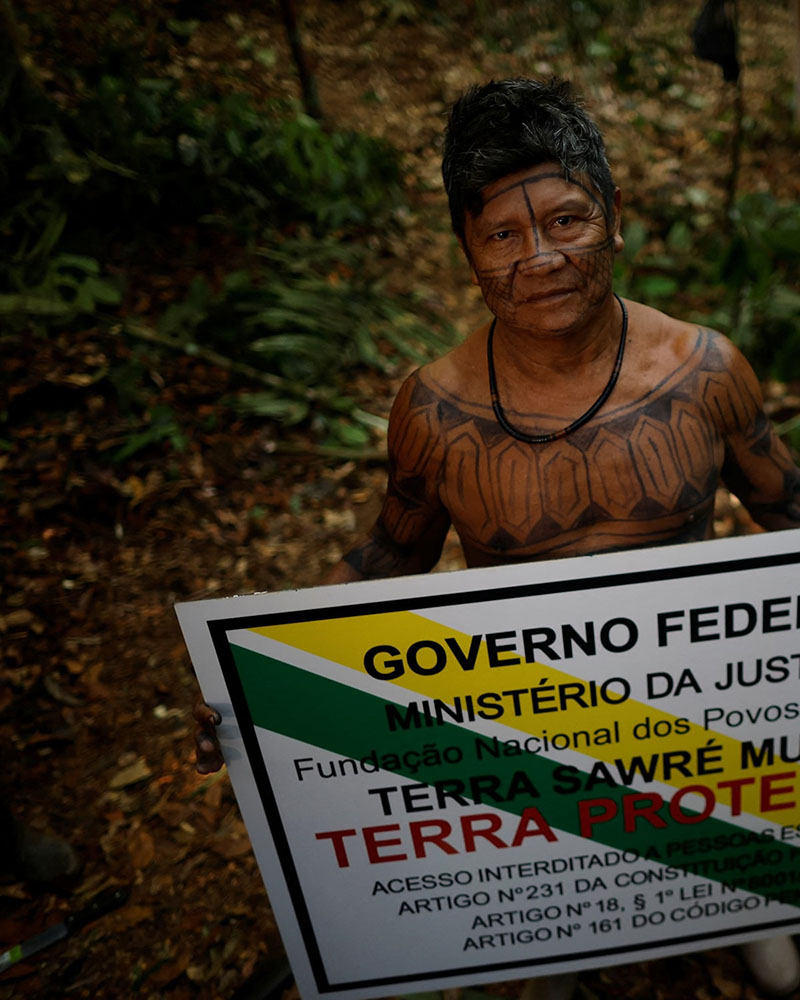ITAITUBA, Brazil, (Reuters) – Fifty Munduruku warriors hack their way with machetes through the undergrowth of the Amazon rainforest, marking the borders of their ancestral lands to finish a task that the Brazilian government has not.
Clearing a path six meters (20 feet) wide through dense vegetation, often darkened by the forest canopy above, the Munduruku men stop every kilometer to nail signs to the trunks of trees, reading: “Federal Government, Sawre Muybu Territory, Protected Land.”
It is a quiet but defiant act from a people fighting for decades to urge Brazil’s government to fully recognize their ancestral lands, a move that would grant legal protections against loggers, miners — and even the government’s own infrastructure projects.
“This is not our job. It’s the government’s obligation to demarcate Indigenous lands, but they are not doing it,” said Juarez Saw, chief of Sawre Muybu, a Munduruku village, after his men put up the 20th and final plaque of their eight-day trek last month.
Brazil’s Indigenous affairs agency Funai said it was short-staffed but working to establish the boundaries of ancestral lands, a process that ground to a halt under the last government.
The Munduruku men are accompanied on the expedition by women and children from the village. At the community jungle camp, where hammocks swing between trees, women prepare food: rice, manioc flour and game. When the hunters cannot find a wild pig, they dine on monkeys. As they cook, young Munduruku jump into the river playfully.
The last time the Munduruku cleared this territory’s borders was a decade ago, enough time for the world’s largest rainforest to erase their work with overgrown vegetation.
“We have been struggling to protect this land for 25 years. We continue to clean the borders to keep them alive,” the chief said. “If we don’t, more loggers and miners will invade.”
The Sawre Muybu territory includes some 1,780 square kilometers (690 sq miles) of jungle on the banks of the Tapajos river, a once pristine tributary of the Amazon that is still one of Brazil’s only major rivers without a hydroelectric dam.
The area has faced rising invasions from illegal loggers and gold miners polluting the rivers and poisoning the fish that feed the Munduruku with life-threatening levels of mercury.
The Munduruku’s fight to defend their land is also part of the battle to keep the Amazon from passing a point of no return, according to environmental advocates. The knowledge, practices and legal status of Brazil’s Indigenous people make them ideal guardians of the rainforest, which is key to slowing global warming, environmentalists say.
The formal demarcation of an Indigenous territory is a key step in securing protections guaranteed in Brazil’s constitution. President Luiz Inacio Lula da Silva took office last year vowing to resume the process of recognizing new reservations, which his predecessor Jair Bolsonaro had halted.
The Munduruku’s expedition to mark their land began on winding rivers with five long outboard skiffs plying their way slowly below a cover of dense vegetation.
One day, the expedition came across an anaconda in the river and prepared to kill the huge constrictor, whose fat is used by the Munduruku for its anti-inflammatory properties. But the snake was so swollen from swallowing its recent prey that they could not pull it from the water.
When the hunters came back with a capuchin monkey on another day, a Munduruku boy ran forward to save two baby monkeys clinging to their mother. He took them into his care and carried them for the rest of the 36-kilometer trek.
The Munduruku, who were armed with old shotguns for hunting game, also came across illegal gold mine camps on the expedition in encounters that were tense but peaceful.
Since taking power over a year-and-a-half ago, Lula’s government has recognized 10 new reservations. There are 62 Indigenous territories awaiting his signature, and about 200 more under study or with defined borders but still unprotected by the government, making them vulnerable to invasion.
While Indigenous advocates would like the government to speed up the process, Lula’s promises have drawn backlash from a conservative Congress, the powerful farm lobby and some of his own political allies who say more roads, railways and power plants are needed in the Amazon to generate jobs.
Hanging over the Munduruku’s push to demarcate the Sawre Muybu land is a plan to build a hydroelectric dam that could flood most of the territory. The 8,000 megawatt project was shelved in 2016 by environmental agency Ibama for failing to consult the Munduruku or provide proper impact studies.
In May, the recently privatized power company Eletrobras asked to update those studies, according to regulator Aneel.
Eletrobras did not reply to a request for comment.
“That shows they have not given up on the project,” said Suely Araujo, who as Ibama president archived the plan.
The Sawre Muybu territory also faces an indirect threat from government plans to build a 1,000-km railway for grain exports from farm state Mato Grosso to a port on the Tapajos, where barges ferry harvests to larger ships on the Amazon.
Indigenous leaders fear the train project, backed by farmers and multinational grain traders to cut transportation costs, may ease access to their land for loggers, land grabbers and miners.
The Munduruku, who number some 13,000 today, have lived for thousands of years along the middle and upper reaches of the Tapajos river in 11 territories — only two of which have full recognition and legal protection from the government.
Funai completed a study in 2013 establishing the Munduruku claim to the Sawre Muybu land, but no government has taken the next step of officially demarcating the territory’s borders.
Tribe member and activist Alessandra Munduruku said at the camp that this lack of demarcation encouraged miners, loggers “and the invasion of our lands.”
“We are not begging, we are defending our rights,” she said. “And we won’t give up.”








